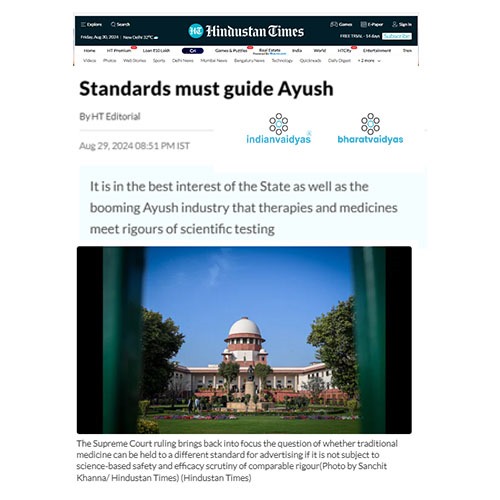Standards must guide Ayush
31-Aug-24 05:17:16

It is in the best interest of the State as well as the booming Ayush industry that therapies and medicines meet rigours of scientific testing
The traditional medicine boom of recent years in India has also seen unprecedented reach for dubious claims by marquee companies through advertisements in mainstream media and social media “virality”. Against this backdrop, the Supreme Court has done well in retaining a key guardrail to protect the consumer. On Tuesday, it stayed an omission of Rule 170 of the Drugs and Cosmetics Rules 1945, notified by the government earlier this year. The rule was an effective yoke on Ayush (Ayurveda, Yoga, Unani, Siddha, and Homoeopathy) advertising that is often in the dock for dodgy claims of efficacy, “absolute cures”, and safety. Indeed, as per data from a government programme to monitor traditional medicine systems, a total of 38,539 cases of misleading advertisements have been reported since 2021.
The ruling brings back into focus the question of whether traditional medicine can be held to a different standard for advertising if it is not subject to science-based safety and efficacy scrutiny of comparable rigour. There is certainly no case to summarily dismiss traditional medicine — Tu Youyou’s 2015 Nobel win in medicine, for the discovery of artemisinin, is rooted in traditional Chinese medicine — but for Indian traditional medicine to be accorded its due credibility, there have to be defined standards of study, experimentation and trials. To be sure, the Ayush ministry published Good Clinical Practices (GCP) guidelines for clinical trials in Ayurveda, Siddha, and Unani, based on the GCP template for conventional (or modern) medicine. Registration of clinical trials of Ayush therapies and drugs under the Clinical Trials Registry-India (CTRI), which is maintained by the Indian Council of Medical Research, was also mandated. However, claims continue to be made without the requisite scientific backing, and some companies have earned judicial ire for exaggerations on conforming with testing rigour without the evidence to corroborate.
The proprietary origins (not described in the accepted texts) of a raft of Ayurvedic medicines and the principle of customising medicine as per individual physiologies in Ayurveda and Unani, often cited by practitioners, make testing their safety and efficacy a crying need. Consumers have a reasonable expectation that there is a regulatory setup that protects them from unsafe or inefficacious medicine, and not just the State but also key stakeholders in traditional medicine, including the big corporations, need to ensure this is not belied.
SOURCE & CREDIT: HINDUSTAN TIMES